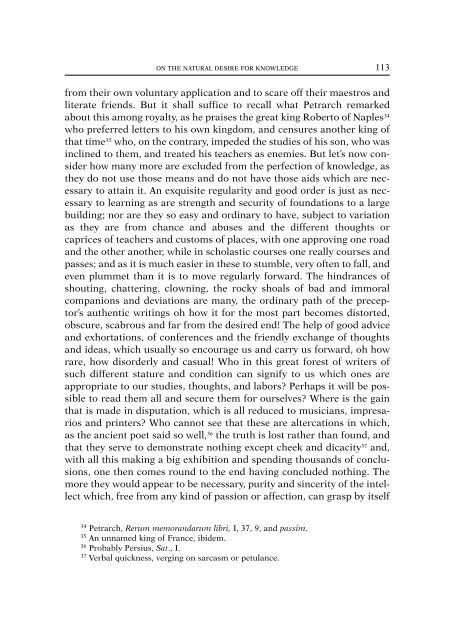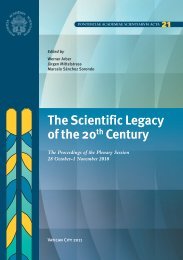ON THE NATURAL DESIRE FOR KNOWLEDGE 113from their own voluntary application and to scare <strong>of</strong>f their maestros andliterate friends. But it shall suffice to recall what Petrarch remarkedabout this among royalty, as he praises the great king Roberto <strong>of</strong> Naples 34who preferred letters to his own kingdom, and censures another king <strong>of</strong>that time 35 who, on the contrary, impeded the stu<strong>di</strong>es <strong>of</strong> his son, who wasinclined to them, and treated his teachers as enemies. But let’s now considerhow many more are excluded from the perfection <strong>of</strong> knowledge, asthey do not use those means and do not have those aids which are necessaryto attain it. An exquisite regularity and good order is just as necessaryto learning as are strength and security <strong>of</strong> foundations to a largebuil<strong>di</strong>ng; nor are they so easy and or<strong>di</strong>nary to have, subject to variationas they are from chance and abuses and the <strong>di</strong>fferent thoughts orcaprices <strong>of</strong> teachers and customs <strong>of</strong> places, with one approving one roadand the other another, while in scholastic courses one really courses andpasses; and as it is much easier in these to stumble, very <strong>of</strong>ten to fall, andeven plummet than it is to move regularly forward. The hindrances <strong>of</strong>shouting, chattering, clowning, the rocky shoals <strong>of</strong> bad and immoralcompanions and deviations are many, the or<strong>di</strong>nary path <strong>of</strong> the preceptor’sauthentic writings oh how it for the most part becomes <strong>di</strong>storted,obscure, scabrous and far from the desired end! The help <strong>of</strong> good adviceand exhortations, <strong>of</strong> conferences and the friendly exchange <strong>of</strong> thoughtsand ideas, which usually so encourage us and carry us forward, oh howrare, how <strong>di</strong>sorderly and casual! Who in this great forest <strong>of</strong> writers <strong>of</strong>such <strong>di</strong>fferent stature and con<strong>di</strong>tion can signify to us which ones areappropriate to our stu<strong>di</strong>es, thoughts, and labors? Perhaps it will be possibleto read them all and secure them for ourselves? Where is the gainthat is made in <strong>di</strong>sputation, which is all reduced to musicians, impresariosand printers? Who cannot see that these are altercations in which,as the ancient poet said so well, 36 the truth is lost rather than found, andthat they serve to demonstrate nothing except cheek and <strong>di</strong>cacity 37 and,with all this making a big exhibition and spen<strong>di</strong>ng thousands <strong>of</strong> conclusions,one then comes round to the end having concluded nothing. Themore they would appear to be necessary, purity and sincerity <strong>of</strong> the intellectwhich, free from any kind <strong>of</strong> passion or affection, can grasp by itself34 Petrarch, Rerum memorandarum libri, I, 37, 9, and passim.35 An unnamed king <strong>of</strong> France, ibidem.36 Probably Persius, Sat., I.37 Verbal quickness, verging on sarcasm or petulance.
114DEL NATURAL DESIDERIO DI SAPEREle sarebbe necessaria. Si serve all’autorità <strong>di</strong> questo e quello dell’antichi,si sostiene questa e quella setta. Onde, mentre solo s’apprendono le cosefilos<strong>of</strong>ate d’altri e si godono i frutti dell’intelletti altrui, con la pigritia esterilità de’ nostri propri, ben ci riduciamo ad esser filodossi 38 invece defilos<strong>of</strong>i: né è meraviglia se alcuno, vedendoci porre il non covelle della privationeper positivo principio de tutti li corpi che realmente sono, 39 neburla col titolo de privatetici, privati veramente <strong>di</strong> scienza.Questa appassionata amicitia dell’autori, già espressamente proibitad’Aristotile, hora così esquisitamente seguita dalli aristotelici, n’impe<strong>di</strong>scenon solo la necessaria lettione del libro dell’universo, 40 ma anco <strong>di</strong>qualsivoglia libro che non sia uscito dalla favorita setta e da’ cari maestri;onde tanto minor speranza vi resti che, date orecchie anco all’altri contemplanti,siamo per manumettere il soggiogato intelletto e quin<strong>di</strong> ce nerestiamo totalmente impe<strong>di</strong>ti nell’acquisto della sapienza, 41 de’ quali mancamenti,per avertimento de’ stu<strong>di</strong>osi, pienamente <strong>di</strong>scorriamo ne linostri Libri delle filos<strong>of</strong>iche querele. 42Dobbiamo anco osservare che l’istessa laurea, instituita già per ornareil compimento delle scienze e venir perciò ad esso incitando, mentre si vedeche in<strong>di</strong>ferentemente corona tutti quelli che finiscono il corso senza riguardoalcuno né dell’arrivare né del zoppicare o andar dritto, viene a porremèta e termino, or<strong>di</strong>nariamente, alle stu<strong>di</strong>ose fatighe <strong>di</strong> ciascheduno, o perchénon creda che vi resti altro che <strong>sapere</strong>, o perché non veda altro gradod’approbatione in litteratura 43 che, se fatiga più oltre, lo <strong>di</strong>chiari maggiore<strong>di</strong> quelli che in esso si contentano fermarsi. Così il dottorato 44 suole a moltitroncar la via del <strong>sapere</strong> <strong>di</strong> maniera che, non pur per insegnar ad altri, ma38 Amanti dell’opinione.39 Inten<strong>di</strong>: vedendoci porre quel nulla che è la privazione quale effettivo principio deicorpi reali. Privazione (stéresis) è termine tecnico della tra<strong>di</strong>zione aristotelica: cfr. Metaf.,V, 22, 1022b 22; Phys., I, 7, 191a 7.40 Cfr. n. 26 supra.41 Inten<strong>di</strong>: restiamo impe<strong>di</strong>ti nell’acquisto della sapienza perché non v’è quasi speranzache, grazie all’aver prestata attenzione anche ad altri filos<strong>of</strong>i, si sia in grado <strong>di</strong> liberarel’intelletto prigioniero.42 Inten<strong>di</strong>: <strong>di</strong> questi ostacoli <strong>di</strong>scuto più a fondo nei Libri delle filos<strong>of</strong>iche querele (evidentementeuno dei suoi numerosi progetti, sul quale però non abbiamo trovato più precisiriferimenti).43 Grado accademico.44 <strong>Il</strong> titolo <strong>di</strong> dottore.
- Page 1 and 2:
THE PONTIFICALACADEMY OFSCIENCESExt
- Page 3 and 4:
Address:The Pontifical Academy of S
- Page 5 and 6:
ISBN 88-7761-083-2© Copyright 2003
- Page 7 and 8:
Quest’edizione del Proponimento e
- Page 9 and 10:
FEDERICO CESI, LA PRIMA ACCADEMIA,
- Page 11 and 12:
10FEDERICO CESI, LA PRIMA ACCADEMIA
- Page 13 and 14:
12FEDERICO CESI, LA PRIMA ACCADEMIA
- Page 15 and 16:
14FEDERICO CESI, LA PRIMA ACCADEMIA
- Page 17 and 18:
16FEDERICO CESI, LA PRIMA ACCADEMIA
- Page 19 and 20:
18FEDERICO CESI, LA PRIMA ACCADEMIA
- Page 21 and 22:
20FEDERICO CESI, LA PRIMA ACCADEMIA
- Page 23 and 24:
22FEDERICO CESI, LA PRIMA ACCADEMIA
- Page 25 and 26:
24FEDERICO CESI, LA PRIMA ACCADEMIA
- Page 27 and 28:
26FEDERICO CESI, LA PRIMA ACCADEMIA
- Page 29 and 30:
28FEDERICO CESI, LA PRIMA ACCADEMIA
- Page 31 and 32:
30FEDERICO CESI, LA PRIMA ACCADEMIA
- Page 33 and 34:
32FEDERICO CESI, LA PRIMA ACCADEMIA
- Page 35 and 36:
34FEDERICO CESI, LA PRIMA ACCADEMIA
- Page 37 and 38:
36FEDERICO CESI, LA PRIMA ACCADEMIA
- Page 39 and 40:
38FEDERICO CESI, LA PRIMA ACCADEMIA
- Page 41 and 42:
40FEDERICO CESI, LA PRIMA ACCADEMIA
- Page 43 and 44:
42FEDERICO CESI, LA PRIMA ACCADEMIA
- Page 45 and 46:
44FEDERICO CESI, LA PRIMA ACCADEMIA
- Page 47 and 48:
46FEDERICO CESI, LA PRIMA ACCADEMIA
- Page 49 and 50:
48FEDERICO CESI, LA PRIMA ACCADEMIA
- Page 51 and 52:
50FEDERICO CESI, LA PRIMA ACCADEMIA
- Page 53 and 54:
52FEDERICO CESI, LA PRIMA ACCADEMIA
- Page 55 and 56:
54FEDERICO CESI, LA PRIMA ACCADEMIA
- Page 57 and 58:
56FEDERICO CESI, LA PRIMA ACCADEMIA
- Page 59 and 60:
58FEDERICO CESI, LA PRIMA ACCADEMIA
- Page 61 and 62:
60FEDERICO CESI, LA PRIMA ACCADEMIA
- Page 63 and 64: 62FEDERICO CESI, LA PRIMA ACCADEMIA
- Page 65 and 66: 64FEDERICO CESI, LA PRIMA ACCADEMIA
- Page 67 and 68: 66FEDERICO CESI, LA PRIMA ACCADEMIA
- Page 69 and 70: 68FEDERICO CESI, LA PRIMA ACCADEMIA
- Page 72 and 73: FEDERICO CESI, THE FIRST ACADEMY, A
- Page 74 and 75: FEDERICO CESI, THE FIRST ACADEMY, A
- Page 76 and 77: FEDERICO CESI, THE FIRST ACADEMY, A
- Page 78 and 79: FEDERICO CESI, THE FIRST ACADEMY, A
- Page 80 and 81: FEDERICO CESI, THE FIRST ACADEMY, A
- Page 82 and 83: FEDERICO CESI, THE FIRST ACADEMY, A
- Page 84 and 85: FEDERICO CESI, THE FIRST ACADEMY, A
- Page 86 and 87: FEDERICO CESI, THE FIRST ACADEMY, A
- Page 88 and 89: BIOGRAPHICAL NOTEFederico Cesi (158
- Page 90 and 91: LYNCEAN RESOLUTION 1That precept, s
- Page 92 and 93: CONDENSED LYNCEAN CONSTITUTIONS 1So
- Page 94 and 95: CONDENSED LYNCEAN CONSTITUTIONS 93h
- Page 96 and 97: CONDENSED LYNCEAN CONSTITUTIONS 95I
- Page 98 and 99: CONDENSED LYNCEAN CONSTITUTIONS 97I
- Page 100 and 101: ON THE NATURAL DESIRE FOR KNOWLEDGE
- Page 102 and 103: ON THE NATURAL DESIRE FOR KNOWLEDGE
- Page 104 and 105: ON THE NATURAL DESIRE FOR KNOWLEDGE
- Page 106 and 107: ON THE NATURAL DESIRE FOR KNOWLEDGE
- Page 108 and 109: ON THE NATURAL DESIRE FOR KNOWLEDGE
- Page 110 and 111: ON THE NATURAL DESIRE FOR KNOWLEDGE
- Page 112 and 113: ON THE NATURAL DESIRE FOR KNOWLEDGE
- Page 116 and 117: ON THE NATURAL DESIRE FOR KNOWLEDGE
- Page 118 and 119: ON THE NATURAL DESIRE FOR KNOWLEDGE
- Page 120 and 121: ON THE NATURAL DESIRE FOR KNOWLEDGE
- Page 122 and 123: ON THE NATURAL DESIRE FOR KNOWLEDGE
- Page 124 and 125: ON THE NATURAL DESIRE FOR KNOWLEDGE
- Page 126 and 127: ON THE NATURAL DESIRE FOR KNOWLEDGE
- Page 128 and 129: ON THE NATURAL DESIRE FOR KNOWLEDGE
- Page 130 and 131: ON THE NATURAL DESIRE FOR KNOWLEDGE
- Page 132 and 133: ON THE NATURAL DESIRE FOR KNOWLEDGE
- Page 134 and 135: ON THE NATURAL DESIRE FOR KNOWLEDGE
- Page 136 and 137: ON THE NATURAL DESIRE FOR KNOWLEDGE
- Page 138 and 139: ON THE NATURAL DESIRE FOR KNOWLEDGE
- Page 140 and 141: ON THE NATURAL DESIRE FOR KNOWLEDGE
- Page 142 and 143: ON THE NATURAL DESIRE FOR KNOWLEDGE
- Page 144 and 145: ON THE NATURAL DESIRE FOR KNOWLEDGE
- Page 146 and 147: ON THE NATURAL DESIRE FOR KNOWLEDGE
- Page 148 and 149: ON THE NATURAL DESIRE FOR KNOWLEDGE
- Page 150 and 151: ON THE NATURAL DESIRE FOR KNOWLEDGE
- Page 152 and 153: ON THE NATURAL DESIRE FOR KNOWLEDGE
- Page 154 and 155: ON THE NATURAL DESIRE FOR KNOWLEDGE
- Page 156 and 157: ON THE NATURAL DESIRE FOR KNOWLEDGE
- Page 158: ON THE NATURAL DESIRE FOR KNOWLEDGE
















